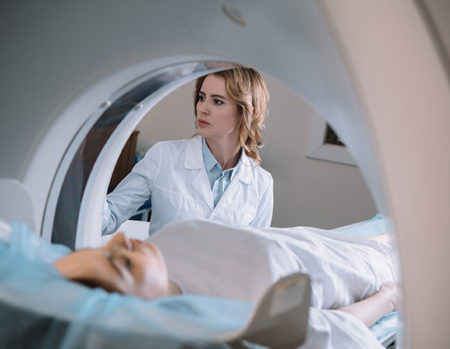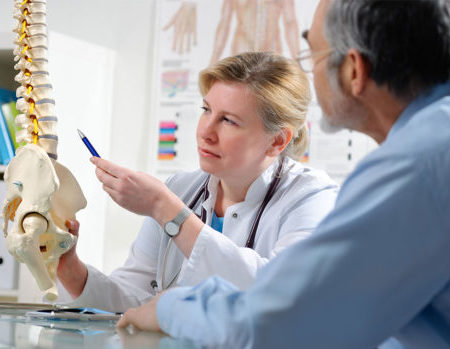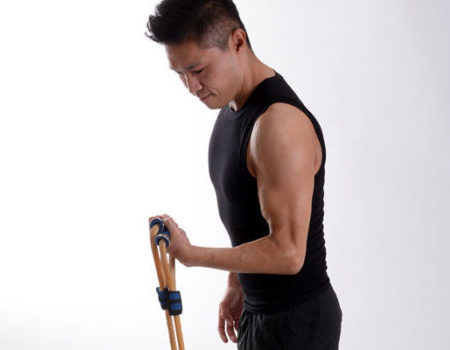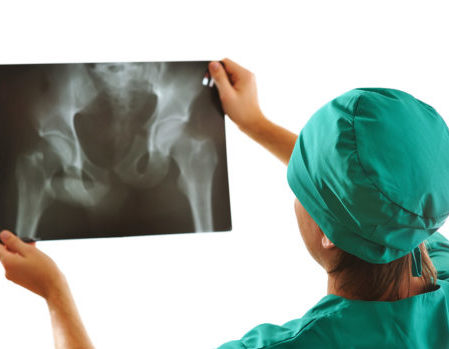Contemplating My Arthritic Hip a Personal Reflection
Aug 21, 2019Richard A. Sweet, M.D. (Retired 2022)
PRELUDE:
A few years ago my wife and I took a warm weather winter vacation with several couple friends. Among our week’s activities, the guys, as usual, played several rounds of golf. It was at the end of that week that with all the right hip pivoting required of the golf swing I noticed for the first time soreness in my hip. When our trip was over, and I returned to normal mid winter life, the symptoms quickly resolved. In short order, the episode was out of mind with the assumption that the soreness had simply been “muscular”. As the calendar turned to the warm weather months of spring and summer and I resumed recreational golf (I usually walk when I play), I had a couple of minor recurrences. Nothing serious. No soreness that interfered with any of my activities, including golf. And I wasn’t particularly worried. I did not even have an x-ray taken. But the soreness was intermittently there, nonetheless. By the following summer episodes of right hip soreness seemed to be occurring more frequently and with greater intensity. At this point, I needed to investigate the cause (my wife tells me the ostrich finally took his head out of the sand) and had x-rays taken. The result: early right hip arthritis. Ugh!
Over time, my hip problem has, as expected, slowly worsened. For the most part it still is not troublesome with daily activities or even with all day standing in the operating room. However, over-the-top golf (as occurs on my “buddy golf trips”) and walking a hilly course has become somewhat of a problem. And more recent x-rays have shown, of course, that the arthritis has worsened. The reality has set in that at some point in the future I am going to have a hip replacement. All of a sudden, the advice I have provided to patients contemplating knee and hip replacement surgery has taken on a much more personal nature.
BIG DECISIONS:
-
When Will I Have Surgery:
 One of the major questions anyone considering knee or hip replacement surgery faces is “how bad does it need to get before I have it fixed?” There is no simple answer to that question. For some who are very fearful of surgery, the pain needs to be disabling to the point where even the simple act of walking short distances becomes impossible. Others who are unrealistic about the risks or the limitations of surgery want it fixed at the first sign of a problem (even with the best operation nothing is ever as good as it was when we were “young and immortal”). For me personally, clearly if my arthritic right hip starts to interfere with normal daily activities I will have it replaced. If it becomes a problem with the physical demands of my surgical profession, the decision to go forward with surgery will be easy. The gray area will be when it really starts affecting and limiting the fun things in my life, like golf, but not yet the day-to-day activities of work and normal life. My wife strongly advises me to quit golf when that time comes and put off surgery. My foursome advises me to get it fixed and don’t miss a tee time. When will I decide to have surgery? Though I am not completely sure now, as I routinely tell my patients, I think I will know when the right time has arrived. At this point I think it is very unlikely I will let myself get to the point that I am unable to participate in recreational activities without having my hip replaced.
One of the major questions anyone considering knee or hip replacement surgery faces is “how bad does it need to get before I have it fixed?” There is no simple answer to that question. For some who are very fearful of surgery, the pain needs to be disabling to the point where even the simple act of walking short distances becomes impossible. Others who are unrealistic about the risks or the limitations of surgery want it fixed at the first sign of a problem (even with the best operation nothing is ever as good as it was when we were “young and immortal”). For me personally, clearly if my arthritic right hip starts to interfere with normal daily activities I will have it replaced. If it becomes a problem with the physical demands of my surgical profession, the decision to go forward with surgery will be easy. The gray area will be when it really starts affecting and limiting the fun things in my life, like golf, but not yet the day-to-day activities of work and normal life. My wife strongly advises me to quit golf when that time comes and put off surgery. My foursome advises me to get it fixed and don’t miss a tee time. When will I decide to have surgery? Though I am not completely sure now, as I routinely tell my patients, I think I will know when the right time has arrived. At this point I think it is very unlikely I will let myself get to the point that I am unable to participate in recreational activities without having my hip replaced. -
The Big One – Anterior vs. Posterior Surgical Approach:
The big current controversy in hip replacement surgery is which surgical approach to use, anterior vs. posterior. That’s too bad. Here is the reality. Both the anterior and posterior approaches are standard, well accepted, ages old surgical approaches to the hip. Neither is remotely new. Both have advantages and disadvantages. For instance, the infection rate and femoral fracture rate is higher with one (anterior) and the dislocation rate is slightly higher with the other (posterior). The recovery rate has been hyped as being shorter with the anterior approach, though in reality there is little difference. Making this all a moot point is the big secret in hip replacement surgery recovery timeline that everyone seems to have forgotten. That forgotten secret is this: we put the implants into the bone with a “cementless technique”. Both the cup and femoral stem have a beaded porous surface into which bone grows to biologically “fix” the implant to the bone. AND THAT BONY INGROWTH PROCESS TAKES 6-8 WEEKS! For biologic ingrowth to occur, the implants must be rigidly fixed in place so that no micro-motion occurs. Micro-motion of the implant in the bone can lead to loosening and result in the need for further surgery. This 6-8 week timeline for bone to “heal” to the implant is the rate-limiting step in recovery. Technically, we as surgeons, try to wedge the implants into the bone rigidly so that we do not need to limit a patients activities or weight-bearing status while this bony fixation of the implant occurs. In reality, if a patient’s bone is too weak or if a patient is too vigorous in early post op activities, micro-motion and early implant loosening is possible. So no matter how the hip is approached surgically, anterior or posterior, the implants will not be rigidly a part of the bone for this 6-8 week healing period.
The big advantage of the posterior approach is simply that it is technically easier. With the anterior approach, the surgeon places the patient on a special surgical table so that the body can be hyperextend at the hip by lowering the foot to near the floor. Then the femur is levered upward so the surgeon can gain the proper angle for access to it for implantation of the femoral component. With the posterior approach, the surgeon is looking straight down the bore of the canal, and femoral component insertion is much simpler. Trust me on this: the easier any operative procedure is, the fewer problems there are post op. And in skilled hands and when properly performed, the posterior approach dislocation rate is a fraction of 1%.
CONCLUSION:
I am facing right hip replacement surgery. That is inevitable. There is no treatment, exercise, medication or therapy measure that can change the inexorable deterioration of my hip. So I am accepting of it. I will probably decide to have surgery when my hip becomes enough of a problem so that it significantly interferes with my enjoyment of life, and certainly if it starts to become an issue with work. I am not afraid of the operation. I know all will go well. I will choose a posterior approach for my surgery with instructions to my surgeon to make the incision long enough and exposure big enough so as to make the operation easy. Though I obviously want as “minimally invasive” a procedure and as quick as recovery as possible, I will make sure my surgeon knows I am not particularly concerned about the results at one week. What I really want is new hip that is solid, durable, and will last the next two decades or more of my life. Those will be my instructions to my surgeon. And they should be your instructions to me as you contemplate having a new knee or hip implanted in you.



 Our patients can receive MRI imaging onsite at both our Louisville and New Albany Clinics.
Our patients can receive MRI imaging onsite at both our Louisville and New Albany Clinics. Providing the latest advances in orthopedic surgery is our specialty.
Providing the latest advances in orthopedic surgery is our specialty. We take a unique, multidisciplinary approach to pain management.
We take a unique, multidisciplinary approach to pain management. Our physical therapists use advanced techniques to help restore strength and mobility.
Our physical therapists use advanced techniques to help restore strength and mobility.  We provide comprehensive, conservative care for a wide variety of foot and ankle conditions.
We provide comprehensive, conservative care for a wide variety of foot and ankle conditions. We offer same- and next-day care to patients with acute injuries.
We offer same- and next-day care to patients with acute injuries. Get back in the game with help from our sports medicine specialists.
Get back in the game with help from our sports medicine specialists.  Our centers are equipped with a state-of-the-art digital X-ray machine.
Our centers are equipped with a state-of-the-art digital X-ray machine.